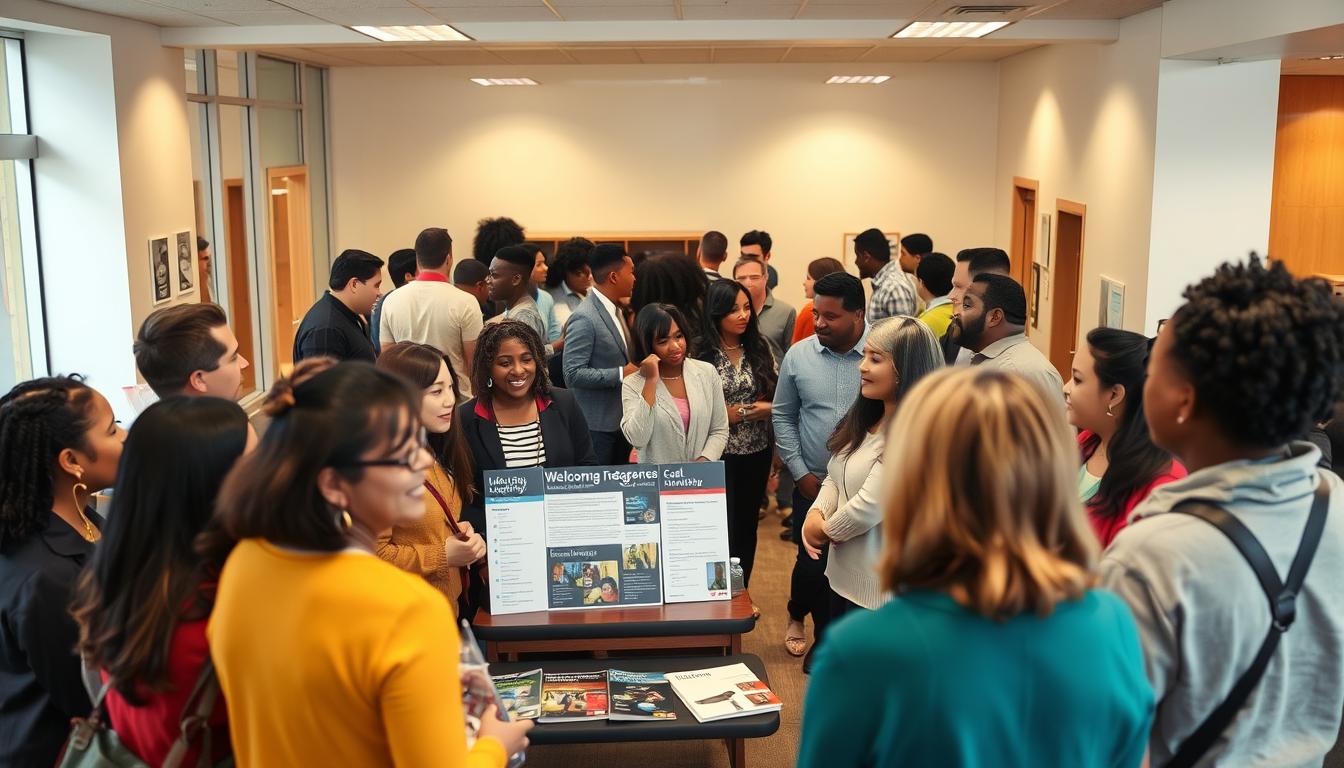Maximizing Impact: How to Network Effectively at International Professional Events
Anúncios
In today’s fast-paced business world, making connections at international events is key. It can boost your career and help your business grow. By using smart networking tactics, you can get noticed and open doors to new chances for teamwork and partnerships.
This article is here to help you make the most of these events. It’s all about how to connect well in different settings. This can take your career to new heights and expand your professional circle.
Understanding the Importance of Networking
In today’s world, networking is key. It helps you move up in your career and opens doors to new chances. A strong network can lead to mentorship, job offers, and working with big names in your field.
Building Relationships for Future Opportunities
Good networking means making and keeping strong connections. These connections can grow into chances for you to learn and grow. By connecting with others, you get advice, job tips, and access to important resources.
Seeing networking as an investment in your future is smart. It opens up new paths and puts you on the right track for success.
Expanding Professional Knowledge and Insights
Networking is a way to learn from others. It lets you see things from different angles and stay up-to-date with trends. By talking and sharing, you learn more about what works best.
This sharing creates a space where everyone can grow together. It’s a chance to learn from each other and work better as a team.
Preparing for the Event
Getting ready for an event is key to networking success. Knowing who will be there and who will speak can make a big difference. It helps in making real connections and having useful talks.
Researching Attendees and Speakers
Looking up who will be at a professional event is a must. It gives you a clue about who to meet and who to talk to. You can use different tools to find this info, like:
- Attendee lists, often given by event organizers
- Social media profiles to see what they’re into
- LinkedIn to find people you know or want to meet
This prep work makes your conversations more meaningful. Knowing who will speak and what they know is also key. It helps start talks that really interest you.
Setting Clear Objectives
Having clear goals for networking is crucial. Think about what you want to get out of the event, like:
- Learning new things from experts
- Finding partners or collaborators
- Meeting new people in your field
These goals help you focus your time at the event. They make sure you’re making the most of your time. With a clear plan, you can get the most out of the event.
Selecting the Right Events to Attend
Choosing the right events is key to getting the most out of networking. There are many options, so picking the ones that match your goals is important. This way, you get to see new ideas and meet people who can help you.
Industry-Specific Conferences and Trade Shows
Conferences and trade shows are great for growing your network. They let you meet important people in your field. You can learn about new trends and find chances to work together.
These events are focused, so you can have deeper conversations. This makes your connections more valuable.
Local vs. International Opportunities
Local and international events both have their benefits. Local events are easy to get to and help you connect with people nearby. They’re good for building strong relationships in your area.
On the other hand, international events open you up to new markets and ideas. They offer a chance to see different perspectives. It’s about finding the right mix of convenience and broadening your horizons.
Crafting Your Elevator Pitch
An effective elevator pitch is a key networking tool. It’s a brief, persuasive message that can open doors and make valuable connections. To make a great elevator pitch, focus on clarity, conciseness, and engagement. This way, you can share a message that grabs attention fast.
Key Elements of a Compelling Pitch
A good elevator pitch should have certain key elements. Consider including the following:
- Clear introduction: Start with your name and what you do.
- Unique value proposition: Show what makes you different and what you offer.
- Engaging story or example: Share a story or achievement that connects with your audience.
- Call to action: Ask the listener to take the next step or meet up.
Tailoring Your Message for Different Audiences
Not everyone is the same, and your elevator pitch should reflect that. It’s important to tailor your pitch for different groups. Adjust the tone, language, and content based on who you’re speaking to. For example:
- Potential clients: Talk about how you can solve their problems.
- Employers: Showcase your skills and experiences that match their needs.
- Collaborators: Emphasize shared interests and goals to build rapport.
Utilizing Social Media for Networking
Social media has changed how we network, making it easier to connect at events. It lets us build relationships online before and after we meet in person. This way, we can keep the conversation going even when we’re not together.
Platforms to Leverage Before and After Events
There are many platforms for networking. LinkedIn is great for finding people to connect with, letting you check out their background and skills. Twitter is perfect for sharing updates about the event and starting conversations.
Using these sites can help you make connections before the event and keep them going after. It’s a way to build lasting relationships.
Engaging with Other Attendees Online
Being active online helps keep relationships strong after events. By sharing your thoughts and experiences, you stay in touch with others. Commenting on posts and sending personalized messages can make your connections feel special.
By using social media for networking, you can improve your professional relationships. It helps you stay connected with your peers over time.
Techniques for Effective In-Person Networking
Learning how to network in person can really help you make strong professional connections. Starting off by introducing yourself to strangers can be tough. But, having strategies for meeting new people can make it easier.
Approaching Strangers with Confidence
Prepared questions can help start conversations and ease the tension. It’s also important to show you’re friendly and open. Stand up straight, smile, and make eye contact to seem welcoming.
This approach not only makes you feel more at ease but also encourages others to join in.
Listening Actively to Build Rapport
Listening well is key to making a connection. Showing you’re really interested in what someone says helps build rapport. Nodding, repeating back what you heard, and asking more questions shows you care.
This makes people feel important and leads to a good conversation for both sides.
After talking, it’s a good idea to follow up with those you met. A quick message about what you talked about can make a big difference. It helps keep the connection alive and makes networking more rewarding.
Following Up After the Event
Post-event follow-up is key for networking success. It’s when relationships start to grow, long after the event ends. Using smart strategies helps turn initial talks into strong partnerships.
Strategies for Maintaining Connections
Personalized communication is a great way to build strong ties. Sending emails that mention specific talks or interests can really boost engagement. Social media also helps keep connections alive, by letting people see each other’s career progress.
Tools to Organize Networking Efforts
Using tools to organize networking can make follow-up easier. CRM systems keep track of interactions, so no connections are missed. Networking apps offer a place to manage contacts and set reminders, making it easier to stay in touch.
Overcoming Networking Challenges
Networking can be tough, especially for those who feel anxious or struggle with cultural differences. Social anxiety makes it hard to meet new people. Cultural differences add to the challenge, especially in international settings. But, with the right strategies, you can make valuable connections.
Addressing Social Anxiety and Introversion
Many people find networking hard because of social anxiety or being introverted. To overcome anxiety, start small. Begin with small gatherings and people you know. Deep breathing and positive self-talk can help calm your nerves.
Setting achievable goals, like talking to one new person, is a good start. It makes the task less overwhelming.
Navigating Cultural Differences
Understanding cultural differences is key in networking, especially in diverse environments. It’s important to respect cultural norms and adapt to different communication styles. Researching the cultures of your contacts can help.
Active listening and asking questions can build trust and show you care. Adapting to various networking styles leads to deeper connections and better collaboration across cultures.
Evaluating the Impact of Your Networking Efforts
After a professional event, it’s key to check how well your networking went. This means looking at the connections you made and what they might lead to. By thinking back on your interactions, you can see which relationships really helped you.
Assessing Connections and Opportunities Gained
Tracking new contacts and possible partnerships is important. Sort your contacts by how relevant they are and what they could offer. This helps you see if your networking is helping you reach your goals.
Adjusting Future Strategies Based on Experience
Changing your approach based on what you’ve learned is crucial. By figuring out what worked and what didn’t, you can plan better for the next time. This way, you can make your networking more effective and get more out of it.
FAQ
What are professional event management services?
How can effective networking enhance my career?
What should I consider when preparing for a corporate event?
How do I choose the right events to attend for networking?
What are the key elements of an effective elevator pitch?
How can social media be used for networking?
What techniques can help with in-person networking?
What should I do after attending a professional event?
How can I overcome social anxiety when networking?
How can I evaluate the success of my networking efforts?
Published on: 28 de March de 2025

Luke Martin
Luke Martin, author of Credwallets.com, is a mathematics graduate with a specialization in financial markets. Known for his love of pets and his passion for sharing knowledge, Luke created the site to provide valuable insights into the complexities of the financial world. His approachable style and dedication to helping others make informed financial decisions make his work accessible to all, whether they're new to finance or seasoned investors.







